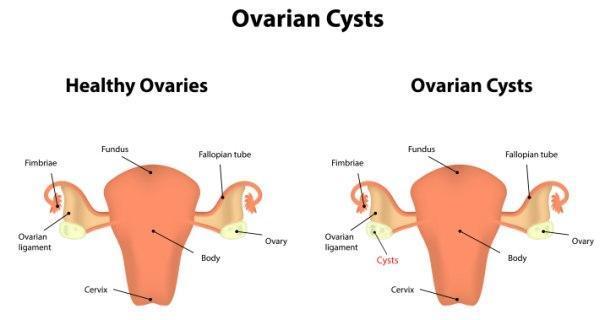A fluid-filled Sac that grow inside or on top of one or both ovaries, Ovarian Cyst are usually asymptomatic. However pain in the abdomen or pelvis is common.

When it comes to the size of an Ovarian Cyst, it said to be variable, ranging from less than one inch up to 4 inches and can also from extremely large masses that measure 12 inches or more in diameter.
TYPES OF CYSTS
The following factors are said to be potential risk-factors that can lead to formation of an Ovarian Cyst in a woman.
An Ovarian Cyst usually does not produce symptoms. They are found out during a routine physical examination or during an incidental finding on an ultrasound performed for other reasons.

Symptoms can however be present with large cysts or ruptured cysts, which are variable and may include:
Among the symptoms, the following need immediate medical attention with the doctors at Juhi Fertility Centre (JFC).
When it comes to a ruptured Ovarian Cyst, they typically cause severe pain that occurs all of a sudden and occurs most commonly during a mid-menstrual cycle or during a period of sexual intercourse or a session of exercising.
When it comes to treatment for Ovarian Cyst at Juhi Fertility Centre (JFC), the following procedures are followed:
In case the Ovarian Cyst continues to grow and does not resolve on its own and also appears suspicious on Ultrasound OR is causing symptoms, then the doctors at JFC may recommend its removal through surgery.
They could be recommended for post-menopausal women with worrisome cysts since there is the risk of Ovarian cancer occurring with the aging of the woman. In such a case the Ovarian Cyst will be removed surgically by the doctors at JFC by Laparoscopy OR Laparotomy.
While Laparoscopy involves the removal of the Ovarian Cyst through several incisions in the abdomen following which the surgeon at JFC will use a camera and specialized instruments for removing the Cyst. On the other hand, Laparotomy (is advisable for removing Cysts that are large or if the doctor suspects that the woman has cancer) involves a large abdominal incision.
In some cases of Ovarian Cysts, an Ovary and/or other tissues will have to be removed.